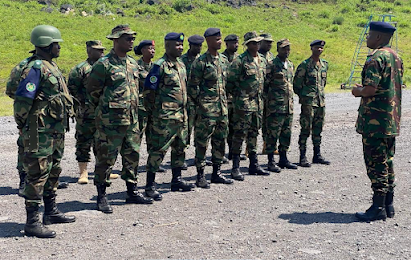Is SADC breaching its own protocols with deployment in DR Congo?
SADC’s Protocol on Politics, Defense and Security Cooperation has, among its objectives, to “prevent, contain and resolve inter-and intrastate conflict by peaceful means.” It is, also, in the objectives of the same protocol to, “consider enforcement action in accordance with international law and as a matter of last resort where peaceful means have failed.”
A January 2024 SADC Communique pertaining to deployment of a Mission in the DR Congo provides, among other things, that the deployment is in accordance with the principle of collective defense and collective action.
According to the Mutual Defense Pact, Any armed attack perpetrated against one of the State Parties shall be considered a threat to regional peace and security and shall be met with immediate collective action.
SADC’s Protocol on Politics, Defense and Security Cooperation has, among its objectives, to “prevent, contain and resolve inter-and intrastate conflict by peaceful means.” It is, also, in the objectives of the same protocol to, “consider enforcement action in accordance with international law and as a matter of last resort where peaceful means have failed.”
With the deployment to the DRC, SADC seems to have assumed:
First, that the insecurity in Eastern DR Congo is a direct attack, by a foreign country, on DR Congo. If SADC states believe there is a direct attack on DR Congo by another state, it is appropriate that they consider collective action to aid the victim state. But in the case of the DR Congo, where the main targeted armed group- M23- is a group of nationals who have become victims of state failure and have taken up arms to defend themselves and seek political inclusion as deserving citizens of DR Congo, isn’t SADC deployment in contravention of the objective to resolve intrastate conflict peacefully?
Even in the case of a possible attack from a foreign state- say Rwanda as DR Congo authorities have been claiming- isn’t SADC acting against itself by using military means without having tried,
In the DR Congo-Rwanda case, Rwanda has reasonable grounds to deploy to DR Congo, particularly in areas occupied by FDLR from which it launches insurgent attacks on Rwanda. Has SADC ignored the grave security threats to Rwanda’s security posed by a closer collaboration between FDLR and the Congolese army? If SADC is aware of these threats yet does little to push DR Congo to withdraw its support to and collaboration with FDLR, does SADC not act in opposition to the objective to uphold regional security?
Second, SADC deployment to the DR Congo seems to have come from the assumption that the M23 claims are baseless and that the EAC did not act in the interests of the DRC, and the region, when it deployed a force to stand between warring parties with intent to provide a conducive environment for political dialogue- which the Tshisekedi government did not adhere to till it pushed the EAC force out.
Considering that SADC formerly deployed to the DR Congo to wipe out the M23, and really did wipe them out, albeit temporarily, what has SADC learned now that it will do to ensure it does not deploy to the DR Congo again to fight the same armed group it will have fought twice before?
SADC is deploying against a group of dissatisfied Congolese nationals without having made sufficient room for listening to their grievances and trying to address them. With this, SADC is acting against its objective to promote the development of democratic institutions and practices within the territories of State Parties and encourage the observance of universal human rights as provided for in the Charters and Conventions of the African Union and the United Nations.
The ultimate solution to the eastern DR Congo security question will incorporate state and non-state parties with concerns that need to be addressed. SADC should know this and should have learned something by now- first, from its return to the DR Congo, which means that its 2013 offensive mission- under the Force Intervention Brigade- didn’t yield the intended outcomes and, then, from the actions of the EAC which sought to put an end to the crisis. But like norm, “they have learned nothing and forgot everything-” not nothing this time.
By: Steven Caleb Katurebe.



Comments
Post a Comment